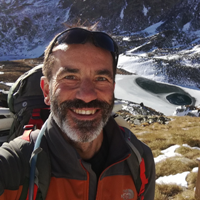Bernat Claramunt will take part in a Pyrenean expedition to show the effects of climate change in the mountains
There will be 15 stages in 15 days. This challenge will be faced by 15 brave people on foot to complete a scientific and cultural journey through the Catalan Pyrenees organised by the Societat Nova Geogràfica with the collaboration of CREAF.
On a 200 km route that will take them from Val d'Aran to Cap de Creus, 15 travellers will discover the effects of climate change on the mountains with Bernat Claramunt, an ecologist and expert in biodiversity in alpine systems.
The aim of this expedition, organised by the Societat Nova Geogràfica, is to venture to appreciate familiar places with a new look, to rediscover what we have close to home. What is happening to mountain flora and fauna? Is Pyrenean culture under threat?
“The Pyrenees are changing rapidly. We are observing changes in the behaviour of animals and plants, and changes in economic activities. But we also see that abandoned villages are beginning to be repopulated.”. JORDI LLOMPART, President at the Societat Nova Geogràfica
This trip will provide a scientific perspective on the environmental and cultural reality of the Pyrenees, on how climate change is damaging its nature and its human population.

“I would like the participants to see the mountain areas not as piles of stones but as a complex and endangered system that we must conserve. On a personal level, it will be a physical challenge and a great opportunity to reconnect with myself”
BERNAT CLARAMUNT, scientific guide of the expedition.
Under a semi-autumnal climate, the mountaineers will cross lush landscapes of beech, holm oak, oak and cork oak trees; aerial spectacles of the bearded vulture; aquatic glides of the Pyrenean newt... all of this dotted with a delightful and historical agricultural and livestock culture.
This journey will be inaugurated on 4 September, which this year coincides with World Vulture Day, a day of special relevance for one of the most vulnerable species in the Pyrenees: the black vulture (Aegypius monachus).
Physically, the trip will be very demanding, but it will not be a sporting competition. The only requirements will be to enjoy, observe and conserve these gigantic refuges of life.







